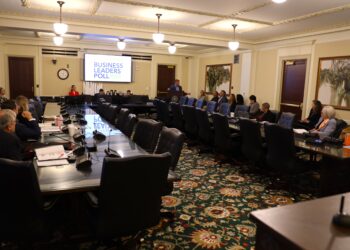By Ben Lepak, executive director of The State Chamber Research Foundation
As Oklahoma legislators kicked off a special session Tuesday to consider reform of the state’s personal income tax, they did so with wind at their back. Many Oklahomans may not know that this effort takes place in the context of a deliberate, piece-by-piece approach to tax reform that has been strategized by state leaders. If legislators can put another win on the board by simplifying and cutting the income tax, they will fortify Oklahoma’s competitive position as we seek to become among the most competitive business states in the nation.
Two years ago, coming out of the economic disruptions of the pandemic and the federal government’s responses to it, Oklahoma’s business community came together to comprehensively study Oklahoma’s tax system and identify opportunities to make our state more economically competitive. Led by The State Chamber Research Foundation, the business community’s think tank, and The State Chamber, the business community’s advocate at the Capitol, elected leaders have been armed with a comprehensive road map to move Oklahoma to the top of national rankings of tax competitiveness.
To build this plan, we partnered with independent, nationally recognized experts at The Tax Foundation, perhaps the most broadly accepted national authority on measuring the business attractiveness of state tax systems. The plan, therefore, is specifically crafted to catapult Oklahoma to the ranks of the top states in the country for businesses to operate in and individuals to flourish.
Making Oklahoma’s tax environment among the best in the country involves several achievable reforms. Recent legislative sessions have seen Oklahoma lawmakers demonstrate their commitment to growing our state by enacting key tax reform measures like becoming the first state in the nation to make full expensing of capital expenditures permanent (a key provision of the 2017 Trump tax cuts), the repeal of the antiquated franchise tax (a direct tax on capital investment), and the elimination of the marriage penalty. The need for these initial steps was identified in our study, and their passage lays a solid foundation for a more competitive tax environment. Now, the focus shifts to refining the state’s income tax structure.
Our income tax proposal emphasizes tax relief and economic growth, but also responsible fiscal management and budget stability. At the heart of our proposal is the simplification of the income tax. The plan calls for a consolidation of Oklahoma’s six graduated income tax brackets into a single, flat-rate tax. Having multiple tax brackets that apply to different levels of income adds nothing to our tax system except for unnecessary complexity and a disincentive for taxpayers to work more and earn more money.
To maximize the impact of the new single rate and ensure a net tax cut for all taxpayers, our plan would also nearly double the standard deduction. This adjustment aims to provide meaningful relief to taxpayers in a time of high inflation, particularly those at the lower end of the income spectrum. It’s a targeted approach to ensure that the benefits of tax reform are felt by everyone across the board.
To maintain budget stability for state government while also keeping Oklahoma competitive going forward, the plan incorporates well-designed tax cut triggers for future years. These triggers will set up additional future tax cuts that move the state further down the path toward eliminating the income tax altogether, a stated goal of the special session call, but will do so in a measured way. Additional cuts will only be triggered when state revenue growth is healthy, preventing unintended fiscal consequences that would affect core services. The result will be that Oklahoma will gradually cut taxes over time as our economy grows and state revenue collections are high enough to absorb the tax cuts. This is a smart approach that has been successful in other states.
The income tax plan put forward by the business community offers a considered and incremental approach to tax reform, aligning with the state’s commitment to both economic growth and fiscal responsibility. It’s a continuation of the positive momentum achieved through recent reforms and a strategic move towards positioning Oklahoma for sustained prosperity. We encourage state leaders to build on the positive strides they have already made as we work together to make Oklahoma the most attractive destination it can be for businesses, investors, and individuals alike.
To read the full income tax proposal, please visit www.StateChamberResearch.org/IncomeTax.

















